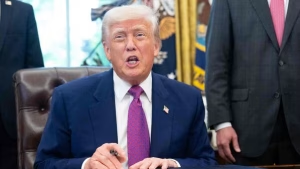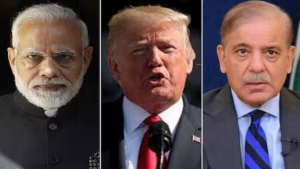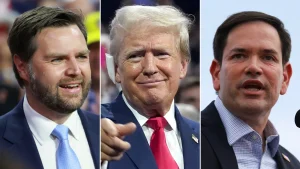Washington D.C. – Did Trump want to act as world leader during India-Pakistan Tensions? Former US President Donald Trump’s recent claims about mediating the India-Pakistan ceasefire have sparked controversy across diplomatic circles. Trump on India Pakistan Ceasefire assertions reveal a troubling pattern of exaggerating his role in international affairs. While tensions between the nuclear-armed neighbors have indeed seen periods of relative calm, Trump’s insistence that he personally engineered peace agreements appears to significantly overstate his actual diplomatic contributions.
His comments have drawn sharp criticism from foreign policy analysts, who argue that such narratives not only distort historical facts but also undermine the vital diplomatic efforts made by regional stakeholders.
The Reality Behind Trump on India Pakistan Ceasefire Claims
Trump on India Pakistan Ceasefire narratives often gloss over the complex geopolitical realities of South Asia. When examining the actual timeline of events, it becomes evident that many of the ceasefire arrangements between India and Pakistan were negotiated through bilateral channels or with the assistance of multilateral organizations. Trump’s administration, while occasionally offering statements of support for peaceful resolution, was rarely the central mediating force he now portrays.

During his presidency, Trump on India Pakistan Ceasefire matters often demonstrated a simplistic understanding of the deeply rooted historical conflicts. His public statements frequently lacked the nuance necessary for effective diplomacy in the region, sometimes even undermining ongoing peace efforts by other international actors.
Also Read: Drones Spotted in J&K After Modi’s Speech: Powerful Ceasefire Intact
Diplomatic Community Responds to Trump’s Assertions
Veteran diplomats and regional experts have expressed skepticism about Trump on India Pakistan Ceasefire claims. Former State Department officials noted that while the Trump administration did maintain communication channels with both nations, the substantive negotiations that led to ceasefire agreements were primarily conducted directly between Indian and Pakistani officials.
“Trump on India Pakistan Ceasefire matters showed a fundamental misunderstanding of the dynamics at play,” commented one former diplomat who served in South Asia during the Trump administration. “The president would often make sweeping statements about solving problems without grasping the historical context or the delicate balance of power in the region.”
Fact-Checking Trump on India Pakistan Ceasefire Statements

When analyzing Trump’s recent statements, several key inconsistencies emerge in his Trump on India Pakistan Ceasefire narrative:
Trump claimed to have personally negotiated a ceasefire that prevented a major war, yet diplomatic records show limited direct involvement from the former president. Most ceasefire arrangements were reached through established diplomatic channels where Trump played a peripheral role at best.
The timeline Trump presents in his Trump on India Pakistan Ceasefire claims often doesn’t align with documented events. He frequently describes interventions at times when no significant ceasefire negotiations were actually taking place.
Multiple statements from Indian and Pakistani officials contradict Trump’s version of events, with both nations emphasizing their own diplomatic initiatives rather than American mediation as the primary factor in de-escalation efforts.
Regional Experts Weigh In on Trump’s Role
South Asian policy analysts have characterized Trump on India Pakistan Ceasefire statements as largely performative rather than substantive. “Trump often positioned himself as a deal-maker who could solve intractable problems simply through force of personality,” noted one regional specialist. “But the India-Pakistan conflict requires deep understanding of religious, territorial, and historical factors that Trump rarely demonstrated.”
Many experts point out that Trump on India Pakistan Ceasefire rhetoric frequently complicated matters by offering oversimplified solutions to complex problems. His transactional approach to foreign policy sometimes created additional tensions rather than resolving existing ones.
The Broader Pattern of Diplomatic Exaggeration
Trump’s claims about the India-Pakistan situation follow a familiar pattern observed throughout his presidency and post-presidency. Trump on India Pakistan Ceasefire assertions mirror similar claims he’s made about North Korea, Middle East peace agreements, and other international hotspots—where his actual contributions have been contested by those directly involved in negotiations.
This pattern of diplomatic exaggeration raises serious questions about Trump’s credibility on foreign policy matters. The Trump on India Pakistan Ceasefire narrative appears designed to burnish his image as a global peacemaker without substantive evidence to support such characterizations.
The Actual State of India-Pakistan Relations
Final Word: Separating Fact from Fiction
As international observers evaluate Trump on India Pakistan Ceasefire claims, it’s essential to distinguish between political rhetoric and diplomatic reality. While American administrations have historically played important roles in encouraging dialogue between India and Pakistan, Trump’s specific assertions about his personal impact appear greatly inflated.


The Trump on India Pakistan Ceasefire story serves as a cautionary tale about the dangers of personality-driven diplomacy that prioritizes perceived wins over sustainable peace processes. For those seeking to understand the true dynamics of South Asian security, looking beyond Trump’s self-aggrandizing statements to the actual diplomatic record provides a much clearer picture.
Moving forward, effective mediation between India and Pakistan will require patient, knowledgeable engagement with the complex factors driving conflict—something that was often missing from Trump’s approach to regional tensions. The Trump on India Pakistan Ceasefire claims ultimately reveal more about his desire for diplomatic accolades than about his actual contributions to peace in South Asia.

